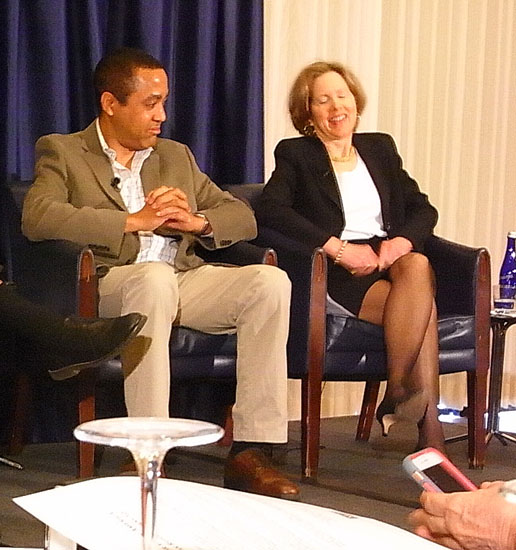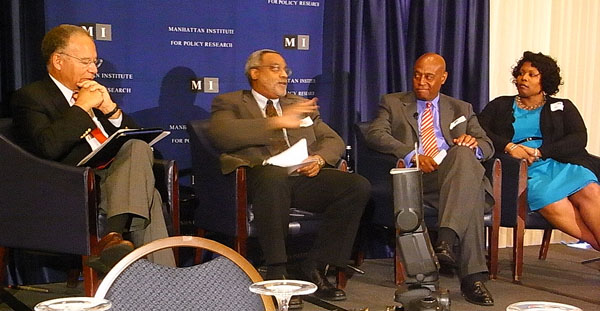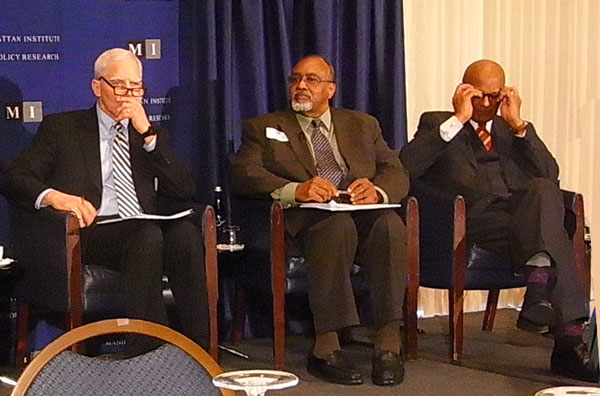Prospects for Black America
AR Staff, American Renaissance, May 6, 2015
Yesterday, AR staff attended a meeting held in Washington, DC, by the Manhattan Institute called “Prospects for Black America: The Moynihan Report Turns 50.” The Moynihan Report, of course, was Daniel Patrick Moynihan’s 1965 study in which he worried that an illegitimacy rate of 25 percent among blacks was such a serious problem it would keep many blacks from enjoying the benefits of the new civil rights legislation. The purpose of this meeting was to grapple with the implications of a black illegitimacy rate that is now over 70 percent and of a white rate–approaching 30 percent–that is already higher than the 25 percent that so shocked Moynihan in 1965.
The meeting was chaired by Jason Riley, Wall Street Journal columnist, Manhattan Institute fellow, and author of Please Stop Helping Us. In his introduction, he promised us panelists who would “challenge conventional wisdom,” are “not afraid to think outside the box,” and who “honestly evaluate what is working and what is not working.” With some exceptions, they came close–within the limits of conventional conservatism.
The first panel was called “Reducing Crime Rates in the Black Community,” which, as Mr. Riley noted, was a departure from conventional thinking even in admitting that black crime rates are high. The two most interesting panelists were Heather Mac Donald of the Manhattan Institute and John McWhorter, who is a professor of American Studies at Columbia.
Miss Mac Donald began by pointing out that the entire “black lives matter movement” is based on the crazy assumption that the biggest threat facing black men today is the police. “In fact,” she said, “no government agency is more dedicated to the proposition that blacks lives matter than the police.” She added that black homicide victimization in New York has declined largely because of data-based policing that tries to predict where and when crime will occur so that police can stop it. “If precinct commanders do not save black lives their jobs are in jeopardy,” she said.
Miss Mac Donald supports the “broken window” approach to crime control, according to which even petty criminality must be controlled if neighborhoods are to be made livable. She is dismayed by the increasingly common argument that this puts an unfair burden on non-whites, and that the solution is “depolicing.” This will only make things worse. She said that blacks want loiterers and dope smokers off the street, and are furious when they reappear the day after they are arrested. “Policing low-level offenses is a moral imperative,” she said, and is the only way to give poor people anything like the crime-free ambience the middle class takes for granted.
She concluded that rebuilding the black family–if it could be done–would be a huge step in the right direction. America has made no real, concerted effort to promote fatherhood, and part of the problem is feminism, with its refrain that “strong women” can rear children without men. “Fathers,” she said, “should not be seen as an optional add-on or frill.” Illegitimacy, she added, is such a disadvantage to children that we should come to grips with the idea that “it is not true that everybody has the right have a child.”
Mr. McWhorter agreed that it would be marvelous if blacks would marry each other, but noted that “after 50 years, there is no way to create a movement in black America to rebuild the family.” If even half the black leaders and columnists and preachers came out with a strong endorsement of fatherhood, the other half would call them vicious names for letting “institutional racism” off the hook. “Let’s imagine that Al Sharpton took the line that black men should be responsible fathers,” he said. “Michael Eric Dyson would write a 10,000-word piece saying Sharpton was a horrible person.” Mr. McWhorter concluded that the best we could hope for is a battle that would be fought to a draw, and that black behavior wouldn’t change.
Mr. McWhorter suggested that the single best thing we could do is legalize drugs. “Everything changes with the whole drug culture and context,” he said. There is a black market for drugs only because they are illegal, and young black dropouts who have dismal job prospects can make a living selling drugs. If drugs were legal, there would be no money in supplying the black market, and they would have to find jobs. Those who think they wouldn’t, said Mr. McWhorter, should recall the dire predictions that black women would freeze to death when President Clinton cut welfare benefits. They didn’t freeze; they got jobs. And if young blacks realized that they couldn’t get by selling drugs, a lot of them would stay in school.
Mr. McWhorter also argued that violence would go down sharply if drugs were legal, because most violence is gang related, and gangs exist to fight over turf. With no drug-selling turf to fight over, the main purpose for gangs would disappear. Finally, he argued, making drugs legal would improve relations between blacks and the police because “the cops and the Freddie Grays wouldn’t encounter each other so often.”
Heather Mac Donald doubted that making drugs legal would solve the problem of black behavior. Many gang shootings, she said, had nothing to do with drugs, and she doubted that louts would take jobs at McDonald’s if they couldn’t make a living as dealers. She also argued that drug use and addiction would go up under legalization, and that we would be trading a crime problem for a public health problem. She urged that the question of legalization therefore be looked at in its own terms rather than as a solution to a race problem.
Mr. McWhorter replied that there are plenty of jobs–even if they are low-level jobs–and that dealers would have no choice but to work. In any case, “race is at a standstill,” he said, and even if there were an increase in drug addiction we might have to consider it “collateral damage” in the effort to improve black behavior.
A woman in the audience pointed out that although everyone blames men for single motherhood, women share the blame. She said that since so many of the fathers are lowlifes, mothers don’t want them having anything to do with their children.
The next panel, on education, was limp. The main contribution of Hugh Price of the Brookings Institution was to say that the next big effort in education should be for schools to give students “social and emotional development.”
There was considerable talk–and little data–about how charter schools and specialized academies dramatically improve student performance. Kevin Chavous of the American Federation of Children buried the audience in clichés: “We need to take the politics out of education,” “We need to develop a long-term plan and stop excluding creative and innovative ideas [whatever they are],” “We used to have a learning culture in America; we need to rebuild that culture,” “All the problems of the black community are traceable to education,” “We must give an opportunity to every child,” etc.
Kaya Henderson, who is the chancellor of the DC schools, bragged that her administration had “radically improved the quality of staff and teachers and of the curriculum.” She said that pre-kindergarten instruction is vital, as is making schools “attractive places for parents and teachers.” She claimed that we have now figured out how to make every teacher or administrator a gifted contributor to the education of children. “All this takes money,” she said, hinting broadly at the need for more.
No one pointed out that Washington, DC, spends more per pupil than any urban district except for New York City, that the black-white gap is the widest in the nation, and that poor black students score lower, on average, than poor blacks in other cities.
University of Missouri professor Craig Frisby vainly tried to steer the conversion in a useful direction. “The issue is that there are people who live in a world of ideology and whose eyes are not open to reality,” he said. “IQ is a fact of life and some children take more time to learn than others.” He said the solution for them is more time in school: longer school days, weekend instruction, and summer sessions.
The next panel, “Restoring the family,” was much better. Robert Woodson, president of the Center for Neighborhood Enterprise, noted that the people who have benefitted most from the civil rights movement and affirmative action are well-educated blacks, and that poor blacks are just as angry as they were 50 years ago. Solutions, however, will not come from white people. “We need self-examination in the black community to give us an opportunity to fight the enemy within,” he said adding, to much laughter and applause, “I’m calling for a one-year moratorium on whining about white folks.”
Poverty and racism did not destroy the black family, he said, because the black family was much stronger when those problems were worse. When welfare became a right, the result was “moral deregulation.”
If illegitimacy rates suggest that 70 percent of black families are dysfunctional, it means 30 percent are functional. “We should study them and find out what their coping mechanisms are,” he said. “We need to stop studying failure; you learn nothing by studying failure. Find out who has a job and why.”
Mr. Woodson also stressed the importance of faith. “Eighty percent of the success in the groups I work with is related to faith,” he said. “You don’t have to accept the content of a particular faith, but you can appreciate the secular consequences of faith and even evaluate the good that it does.”
Glenn Loury of Brown University pointed out that in any conversation about race, “facts don’t govern; the narrative governs,” and the narrative is one of white responsibility for the misbehavior of blacks.
“How do you rehabilitate marriage?” he asked. It is very difficult because it means “pushing against the zeitgeist” and because the “policy tools of the state–tax rates, welfare policies–are very crude.” Some people, he noted, are so desperate for allies in the fight to save marriage that they welcome homosexual marriage. “We desperately need leadership,” he said. The President of the United States should assume “countercultural leadership against the zeitgeist” and promote marriage.
Mr. Loury was dismayed by the widespread assumption among blacks in Baltimore that the city indicted police officers in the death of Freddie Gray only because there were riots. “Is this how we get justice,” he asked, “by rioting?”
Mr. Loury also wanted to know how society instills a commitment to be a good person. Why do some people refrain from crime only because they are afraid they will be caught while others think “our people just don’t do that”? “There is no substitute for reaching that spiritual place inside of a person,” he said, and religion should have a place in any discussion about improving black behavior.
Finally, he noted that “people get into leaky boats and come from all over the world to live in the United States, and they generally do pretty well.” This makes people turn to blacks and ask, “What’s up with you people?”
Ron Haskins of the Brookings Institution said that there has been some success in a Colorado program to reduce the number of births to unmarried women. He said there was private funding for long-acting, reversible contraception such as IUDs for poor women, and many were glad to get it. Illegitimate births and abortions declined, but conservatives didn’t like the program, so the Colorado government won’t fund it.
During the question period, an AR staffer referred to Mr. Loury’s question to blacks–“What’s up with you people?–and pointed out that Linda Gottfredson, Charles Murray, and Richard Lynn have offered a partial answer: racial differences in heritable traits such as intelligence. Should we research this question or is it hopelessly taboo?
Mr. Loury said that any line of investigation should be open: “I don’t want to live in a society that prohibits research.” However, he pronounced himself “not persuaded” by the evidence for racial differences in IQ, adding “we don’t even need to get to that” because there are many ways to improve outcomes for people, regardless of individual or group differences in ability.
Ron Haskins said that genetic explanations are “crazy;” bad schools, dangerous neighborhoods, and poverty explain black behavior.
The final panel was a lively dialogue between Jason Riley and Johnny Taylor of the Thurgood Marshall College Fund. Mr. Taylor, who works closely with black colleges, noted that they account for 20 percent of black graduates. He said that spaces are going begging in some of them, and that tuition is low, so there is plenty of opportunity for blacks who want to go to college.
Mr. Taylor criticized the limits on what can be said on campus. He is involved with choosing commencement speakers, and the slightest deviation from conventional views is a disqualification. “We have a new generation of students who think that anyone who disagrees with you shouldn’t be allowed to speak,” he said.
Mr. Taylor said a producer had asked him about the Baltimore riots on television. During the pre-interview he mentioned that Baltimore spends more on each public school student than virtually any other city in America; he was not put on the program.
“Whites want us to be successful,” he said, adding “I’m convinced that the solution lies entirely in the African-American community. Only we can fix what’s wrong.” He noted that although everyone is accusing Silicon Valley of discriminating against black programmers, his organization just got $40 million from Apple to try to increase the number of black engineers. The problem is supply, he said, not discrimination.
Mr. Taylor echoed the view that when the facts conflict with the narrative, “it’s to hell with facts. The narrative takes on its own life and is what is talked about in the barbershops.”
Mr. Riley agreed, noting that we are all supposed to believe that there simply are no jobs for blacks, even though “there are always jobs for people who have a work ethic. The facts don’t matter.”
He pointed out that the big problem in Ferguson was supposed to be that a white-minority government was running a majority-black town. However, the results were the same in Baltimore even though it is run by blacks. “Maybe the problem is high black crime rates,” he said, “and police responding to where the 911 calls originate.”
“We don’t talk about crime rates,” said Mr. Riley. “We talk about incarceration rates, as if they had nothing to do with crime rates.” So long as blacks account for so much crime–13 percent of the population commits half the murders–“there will be tension between young black men and the police.” He added that “if the police are viewed as an occupying force and the result is less policing it will only mean a higher [black] body count.”
Today’s blacks, said Mr. Riley, “are taught to obsess over race and ‘microaggressions.’ I don’t know what Martin Luther King would have made of a term like ‘microaggression’.”
Mr. Riley also mocked the idea that Silicon Valley discriminates against blacks and was dismayed that tech companies let themselves be badgered by black “leaders.” “If Jesse Jackson were concerned about what’s good for black people,” he said, “he would go back to Chicago and tell black men to stop shooting each other. Pull up your pants. Finish school.”
Affirmative action, said Mr. Riley, has devalued the diplomas given to blacks because it is rational to assume that blacks were held to lower standards. Preferences also make it more likely black students will drop out or switch to mushy majors. When California banned race preferences, the black graduation rate jumped because “blacks went to schools that met their real needs and abilities.”
Mr. Riley made consistently good points–except for a silly crack at the very beginning of the conference. “You’re at the meeting on prospects for black America,” he said. “If you want to hear about prospects for white America you can go to any other room in the Press Club.”
Aside from the pabulum about education, there was almost nothing to disagree with at this conference. It is refreshing–and healthy–to hear blacks assert publicly that whites are not the problem, and that blacks will have to save themselves.
Unfortunately, there was no talk about the terrible, dysgenic fertility among blacks. So long as college-educated black women have few or no children while addicts have five or six, things will get worse. The Colorado contraception program was mentioned only in passing. Heather Mac Donald said that not everyone should have children but said nothing about how to stop them.
The only thing that will seriously reduce degeneracy–for blacks or anyone else–is to prevent reckless procreation by deadbeats. Sharp cutbacks in benefits for single mothers would help, as would serious financial incentives for tubal ligation. For only so long can the competent be taxed to support the proliferation of the incompetent. If we want more marriage we must produce more Americans who are capable of understanding why it is necessary.
[Update: Two days later, we note that other than this write up, there is only one media report on the Manhattan Institute conference. C-SPAN filmed the most pointless of all the panels: the one on education! The American media are not interested in hearing blacks explain that they must solve their own problems rather than blame white people.]


















